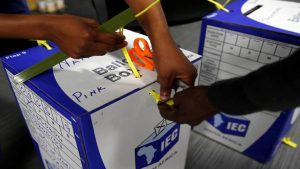The Independent Electoral Commission (IEC) has failed to answer why it continues to conduct its elections manually instead of electronically – even more especially considering the fact that the IEC has an electronic voters’ roll database that exists. When it comes to elections however, there is a conscious decision to conduct the elections manually, which is adding to the conversation around the credibility of the elections and the integrity of voting processes.
Asked to explain the rationale behind this during a media briefing on Friday evening, the IEC’s Janet Love could only say that elections have been done this way before – and that they might consider doing things differently next time… leaving the questions “Why?” still standing.
“The process that we are using on this occasion is not different to the process that we have used all along. We have a voters’ roll. Yes, it is captured electronically, for the purposes of review, for the purposes of updating and so on. But when people go to a voting station, it has always been the case that the voters roll has been printed and as people present themselves with their valid ID’s they are marked off manually.”
Earlier this week, IEC CEO Sy Mamabolo came close to admitting that voter could vote twice, though he mentioned this was a punishable offence.
He admitted that the zip-zip machines at voting stations were not connected to an live network which would prevent a member of the public who had already voted from voting again at a different station.
“The zip-zip machine is not connected to any live network. It operates as a local machine to facilitate voting at particular stations.”
But it would seem it is a concession the IEC are not willing to make – that it is indeed possible for people to vote more than once. Pressed on the arrests that they reporting to have made around issues of double voting earlier this week, the IEC are now saying the arrests were only because of “attempts” to double vote.
The question remains “why does the IEC choose to conduct elections manually, while they already have the voters’ roll electronically, which could prevent double-voting and help in quicker counting, among other things?”
Earlier on Saturday, 27 parties who called for a rerun of the elections raised these issues in a legal challenge they have now brought against the IEC, in an attempt to halt the announcement of the results – as they deem the voting processes to have been laden with flaws.
The parties are protesting that by virtue of zip-zip machines not working at some stations, the IEC was in no position to determine “whether a voter who represented him/herself at the voting station was a registered voter; whether such voter had already cast their vote on the same day at a different voting station; or whether such a person is ordinarily registered in a different province than the province where the vote was in fact cast, which is not allowed.”
They have also raised complaints that “people were given configurations of ballot paper – sometimes 2 National or 2 Provincial and in the North West there are even reports of people being given 3 ballot papers.”
Even more reason why the IEC needs to consider conducting the elections electronically to avoid such issues, and once and for all deal with the question, “Why are is the IEC choosing to conduct elections manually?”
To read the legal challenge: read here….
Disgruntled political parties (Text)






